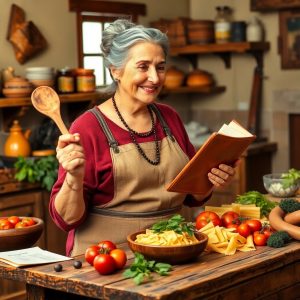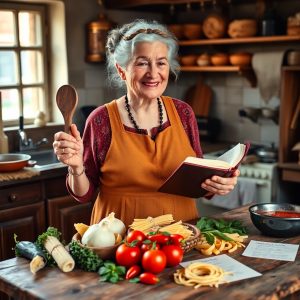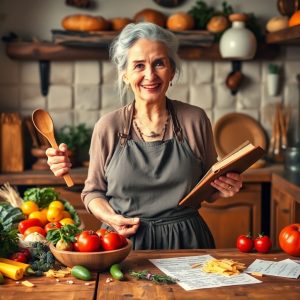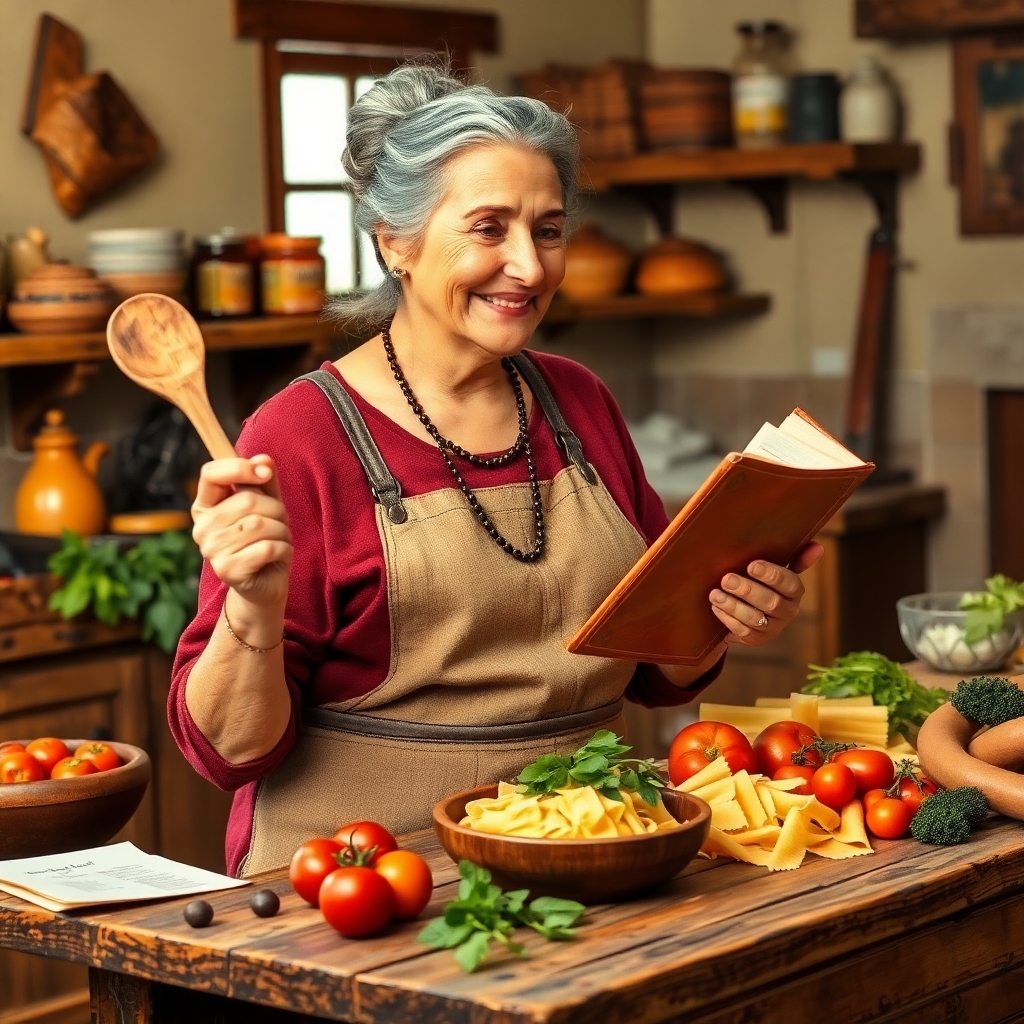Italy is a country where food is more than sustenance—it is a form of language, memory, and love. Every dish carries with it centuries of tradition, and behind every tradition, there is usually a grandmother, or *Nonna*. Nonna is not simply a cook; she is the guardian of recipes, the keeper of flavors that tell a family’s story. For tourists, the chance to taste food from an Italian grandmother’s kitchen is a dream, but to learn her secrets is something else entirely.
One American tourist found himself in such a situation. He had traveled through Tuscany, admired vineyards, and eaten at restaurants praised by guidebooks, but what he longed for was authenticity: a true homemade Italian meal. His wish came true when a local family invited him to their home for dinner. At the heart of the gathering was Nonna, a small, lively woman with bright eyes and flour on her hands. She was famous among her relatives for her spaghetti sauce, a dish everyone claimed was the best they had ever tasted.
The First Taste

When the steaming bowl of pasta arrived at the table, the tourist leaned forward eagerly. The sauce was thick, red, and aromatic, with the kind of fragrance that lingers in memory. He twirled the spaghetti carefully on his fork, took a bite, and closed his eyes. The balance of flavors was astonishing. There was garlic, certainly, and tomato so fresh it tasted like the sun itself had ripened them for this moment. There was richness from olive oil, warmth from herbs, and something he could not name but that made the dish taste like comfort itself.
The family ate joyfully, laughing and telling stories, while the tourist found himself thinking only of one question: *How did she make this?*
The Bold Question
After dinner, he approached Nonna, who was wiping down the wooden table. “Your sauce,” he said carefully, “was the best I have ever tasted. Would you tell me how you made it?”
Nonna looked up at him with a playful twinkle. “Ah, it’s a secret!” she replied, patting his hand gently.
But the tourist was not ready to give up. “Please,” he insisted, “just a little hint. What’s in it?”
Nonna leaned forward, lowering her voice as if she were about to share something precious. “A little bit of love, a little bit of garlic… and a lot of olive oil,” she whispered. Her eyes sparkled as if the secret were hidden in plain sight.

The Search for More
The tourist laughed but pressed again. “No, really—what else? Tomatoes? Herbs? Is there something special you add?”
Nonna shrugged with exaggerated innocence. “Well,” she said, “when you are cooking for a large family, you need a little bit of garlic, a little bit of olive oil, and a little bit more garlic.”
Her answer was both playful and serious. Everyone at the table chuckled, used to her evasive wisdom. The tourist realized she had no intention of handing over a step-by-step recipe. To Nonna, cooking was not about measurements written on a page. It was about instinct, practice, and above all, love.
Why Nonna Protects Her Secrets
There is a reason Italian grandmothers guard their recipes so fiercely. For them, cooking is not just about feeding people but about preserving identity. Each family has its own variation of the “perfect” sauce, shaped by region, tradition, and memory. To hand it over casually to a stranger would feel like giving away a part of themselves. Instead, they offer philosophy rather than instruction: cook with generosity, season with patience, taste as you go.
Nonna’s “little bit of garlic” was more than a cooking tip; it was a metaphor. It meant that flavor comes not from exact portions but from attention and love. Her refusal to spell out the ingredients was not unkindness but a reminder that real cooking cannot be copied like a formula. It must be lived, felt, and repeated until it becomes second nature.

The Lesson Hidden in Humor
The tourist never did learn the exact recipe, but he gained something far greater. He discovered that what makes Italian food so extraordinary is not only the ingredients but the way they are handled—with respect, patience, and affection. Nonna’s secret was not locked in a spice jar but in the rhythm of her hands as she stirred the pot, in the way she tasted and adjusted, and in the joy she felt serving it to her family.
When she said the secret was love, garlic, and olive oil, she was telling the truth in her own way. Love gave the food its meaning. Garlic gave it its soul. And olive oil, rich and golden, gave it its heart.
The Tourist’s Reflection
Back home, the tourist tried to recreate the sauce. He sautéed garlic, drizzled olive oil, and used the best tomatoes he could find. It was good—delicious even—but something was missing. He realized that the missing ingredient was not something he could buy. It was the atmosphere of family around the table, the laughter echoing in the kitchen, the sense of continuity that comes from recipes passed down for generations.
He smiled, remembering Nonna’s shrug and her playful words. Perhaps the real secret was not meant to be written down. Perhaps it could only be discovered by cooking again and again, by failing and improving, by serving others with joy.

Why This Story Endures
The tale of the American tourist and the Italian Nonna is funny, but it also captures something essential about Italian culture. Food in Italy is not about speed or convenience but about connection. Nonna’s secret recipe is less about hidden spices and more about the values she embodies: care, tradition, and generosity. Tourists may come looking for formulas, but what they find instead is wisdom disguised as humor.
Every Italian family has a Nonna, and every Nonna has her secrets. These secrets are never really secrets; they are reminders that food is life, and life cannot be reduced to a list of steps.
Conclusion
In the end, the tourist did not walk away with a recipe written on paper, but he carried with him something more lasting: a story, a memory, and a lesson. He learned that the true art of Italian cooking lies not in strict instructions but in intuition, patience, and the spirit of sharing. Nonna’s sauce would remain unique, a flavor tied forever to her hands and her kitchen.
But every time the tourist cooked pasta back home, he remembered her words. He would add a little garlic, pour a little olive oil, and smile as he stirred, imagining her voice reminding him to add just a little bit more garlic. And in that moment, though he could never replicate the exact taste, he understood what she meant: the real secret was never in the ingredients. It was in the love with which they were given.
@nonna.elda.cooks 🍕 Nonna shares her secrets with @The Young Nonno before trying @PORTA for the first time. Available now at @Sobeys in Canada. Buon appetito! #pizza #food #italian #nonna #foodie #family #eatporta #ad ♬ original sound – Elda 🇮🇹 & Alessandra
